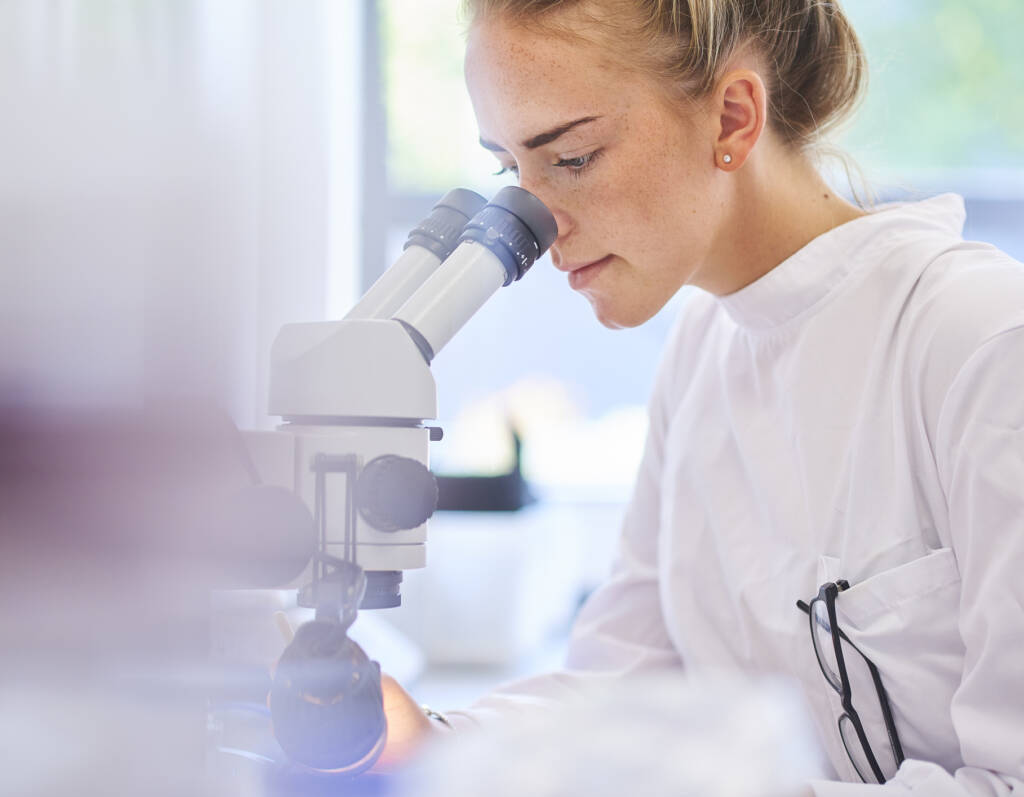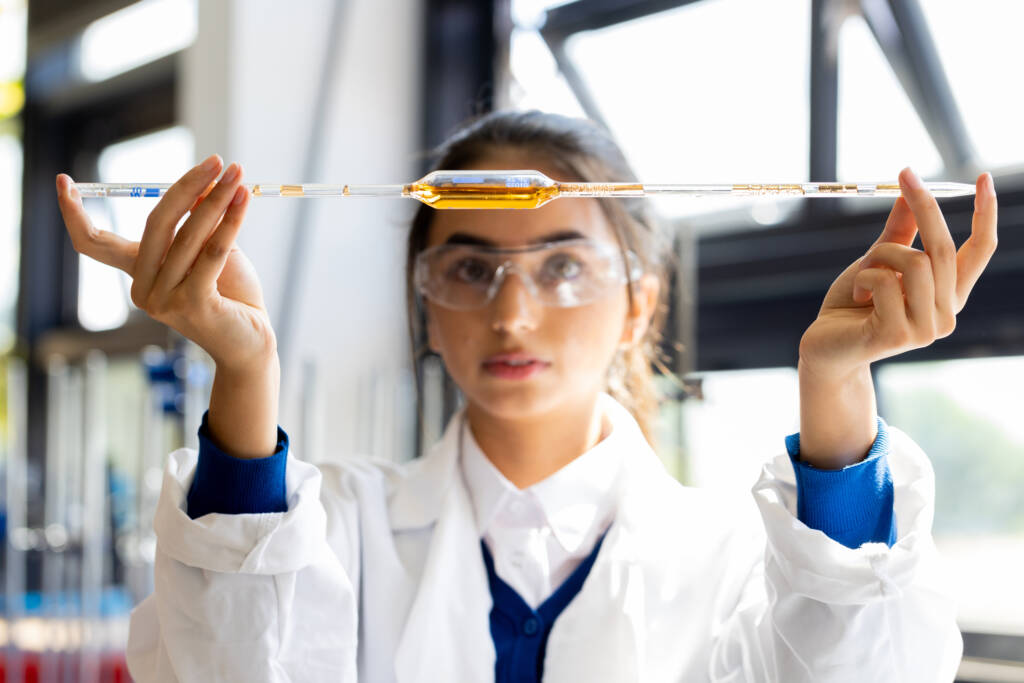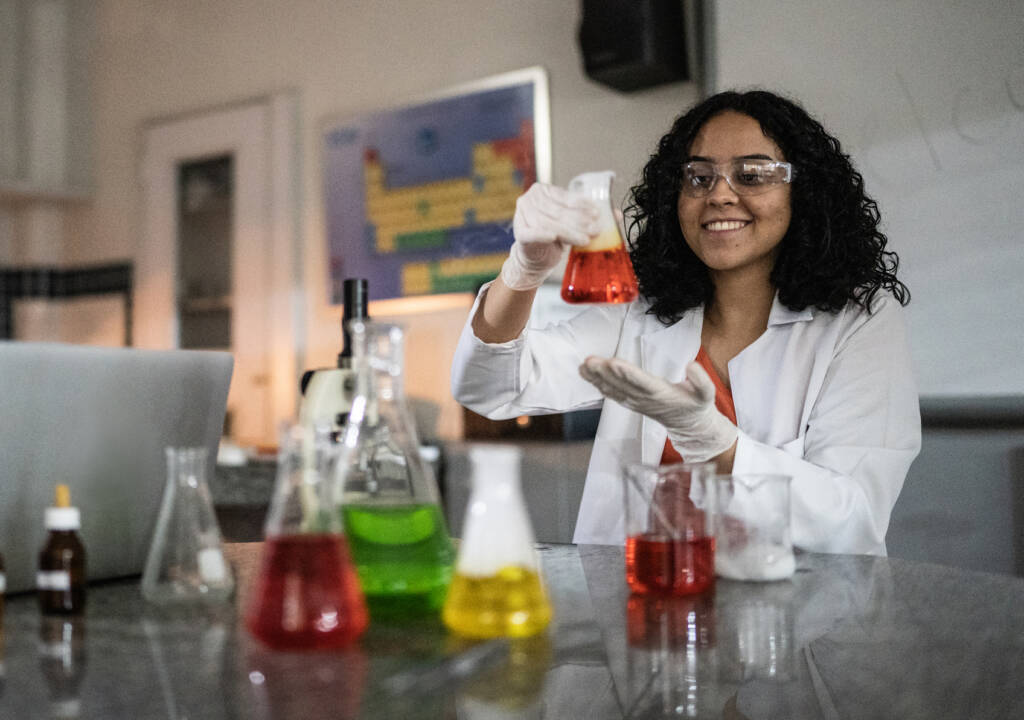
Biology/Biology Honors (lab)

The Biology course is a two-segment study that builds on the foundations of life science, scientific practices, and scientific thinking skills. In this course, students will explore the relationships between living things and their environments. Students will develop an understanding of biological concepts through scientific inquiry, investigations, interactive experiences, higher-order thinking, real-world applications, interpreting and collecting data, and virtual and hands-on experiences. The key big ideas of the Biology course are molecular, cellular, heredity, evolution, classification, organisms, populations, and ecosystems. Students will enhance their mastery of biological concepts, which will enable them to make real-world connections and apply their understanding to everyday life.
Major Topics and Concepts
Module 1
- Exploring Life
- Chemistry of Life
- Earth’s Early Atmosphere
Module 2
- Properties of Water
- Microscopes
- Early Cells
- Cell Structure and Function
- Cellular Energy
- Cellular Respiration
- Photosynthesis
Module 3
- Cell Division
- Meiosis
- Mendel
- Heredity Patterns
- DNA Replication
- Mutations
- Biotechnology
- Health and Genetics
Module 4
- Ecology
- The Biosphere
- Ecosystems
- Impacts on our Ecosystem
- Recovering Ecosystems
- Recycling
Module 5
- Evolution
- Evolutionary Relationships
- Primate Evolution
Module 6
- Classification of Living Organisms
- Bacteria
- Protists
- Fungus
- Plants
- Plant Cells and Tissues
- Plant Growth, Reproductions, and Development
- Animals
Module 7
- Nervous and Endocrine Systems
- Respiratory and Circulatory Systems
- Digestive and Excretory Systems
- Muscular, Skeletal, and Integumentary Systems
- Reproductive System
- Immune System
Competencies
Foundations of Biology
Students will demonstrate an understanding of the foundations of biology by explaining the scientific method, describing the chemistry of life, and describing early Earth.
Cellular Reproduction
Students will demonstrate an understanding of cellular reproduction by explaining cell division, explaining the processes of DNA Replication and Protein Synthesis, describing heredity patterns, and explaining mutation factors.
Origin of Life
Students will demonstrate an understanding of the origin of life by describing the properties of water, describing cell structure and function, describing cellular energy, and explaining cell transport.
Diversity of Organisms
Students will demonstrate an understanding of organisms and diversity by describing microorganisms, describing plant and animal characteristics, explaining the structure and function of human body systems, and describing the human immune system.
Scientific Connections
Students will demonstrate an understanding of scientific connections by describing evidence of evolution, explaining the process of natural selection, and explaining the classification of living organisms.
Earth's Diversity
Students will demonstrate an understanding of Earth’s diversity by describing factors within an ecosystem, explaining levels of organization in ecosystems, and explaining impacts on ecosystems.
Projects allow students to demonstrate competence and understanding of concepts and skills by completing a career-related task. Each competency is addressed through a unique project that is based on a real-life career task.
Please review the competency statements to learn more about the major topics and concepts covered in this offering.
Projects
Biochemist
You will take on the role of a Biochemist working for a space travel and exploration company tasked with creating a design model and proposal for a biodome on Mars.
Water Resource Specialist
You will take on the role of a Water Resource Specialist for a water conservation group tasked with creating a fact sheet about water resource protection.
Puzzle Design Artist
You will take on the role of a Puzzle Design Artist tasked with creating a science-based puzzle blueprint drawing.
Environmental Specialist
You will take on the role of an Environmental Specialist for a land preservation trust tasked with creating a report on species diversity and ecology on a piece of their land.
Wildlife Biologist
You will take on the role of a Wildlife Biologist for a museum tasked with creating a proposal for an exhibit on evolution and natural selection.
Digital Designer
You will take on the role of a Digital Designer and Editor for an ecological protection group tasked with creating visuals to represent information on plant species.
Health Education Specialist
You will take on the role of a Health Education Specialist for the Centers for Disease Control tasked with creating a Public Service Announcement about a virus.
Competencies
Foundations of Biology
Students will demonstrate an understanding of the foundations of biology by describing the scientific method, explaining elements of the chemistry of life, and describing Earth’s early atmosphere.
Cell Structures and Processes
Students will demonstrate an understanding of cell structures and processes by analyzing properties of water, describing cell structure and function, explaining processes of cellular transport, and explaining cellular energy.
Heredity and Cell Reproduction
Students will demonstrate an understanding of heredity and cell reproduction by comparing types of cell division, describing heredity and genetic mutations, explaining the process and applications of DNA replication, and explaining the process of protein synthesis.
Ecological Systems
Students will demonstrate an understanding of ecological systems by describing fundamentals of ecology, summarizing the characteristics of the biosphere, describing elements of ecosystems, and explaining the impact of changes on ecosystems.
Evolution and Natural Selection
Students will demonstrate an understanding of evolution and natural selection by explaining the theory of evolution and describing the process of natural selection.
Classification and Diversity
Students will demonstrate an understanding of classification and diversity by explaining the classification of organisms and describing the features specific to organisms in each kingdom.
Systems of the Human Body
Students will demonstrate an understanding of systems of the human body by describing the structure and function of the human body systems and comparing body system actions.
Experiences allow you to explore a career field you’re curious about while mastering competencies for school credit. Through experiential learning, you will learn skills and apply them to tasks you would complete as part of a career rather than completing traditional assessments like essays or tests. During your Experience, you’ll work with a professional in the field to support your learning whom we call an “outside expert.” You’ll earn a badge for your accomplishments to share on social media and higher education platforms, or with colleges, potential employers, peers, and colleagues to display your qualifications.
Here’s how Experiences work:
- Each competency you work on is addressed through a separate deliverable predetermined by you and your instructor.
- Guided learning for each module consists of research and/or work with a professional in the field. Your instructor will coach you through this process.
- Each module culminates in a final demonstration of understanding, which includes a deliverable and a discussion-based assessment with your instructor.
- Here’s an example:
Let’s say you’re curious about a career in healthcare. You decide you’d like to learn about this career area, make a professional connection, earn a badge, and meet competencies for your 9th-grade English requirement. While enrolled in English 1 Experiences, you conduct research to better understand language and structure in writing. Then you may work with an Occupational Therapist to help apply your writing skills to the creation of an informational video about adaptive equipment for patients. The video aims to advise family members of patients regarding the use of accommodations and equipment to help patients perform daily tasks. Now you’ve earned the Language and Structure in Writing competency! This is just one example of the many ways Experiences can bridge competencies to careers.
Obtaining an Outside Expert: Prior to enrollment, please have an idea for an outside expert in mind or consult with our counseling department by emailing [email protected] for help in identifying one.
*A parent/guardian permission form and background check of the outside expert are both required to work with outside experts without parental supervision.
Competencies
Foundations of Biology
Students will demonstrate an understanding of the foundations of biology by explaining the scientific method, describing the chemistry of life, and describing early Earth.
Cellular Reproduction
Students will demonstrate an understanding of cellular reproduction by explaining cell division, explaining the processes of DNA Replication and Protein Synthesis, describing heredity patterns, and explaining mutation factors.
Origin of Life
Students will demonstrate an understanding of the origin of life by describing the properties of water, describing cell structure and function, describing cellular energy, and explaining cell transport.
Diversity of Organisms
Students will demonstrate an understanding of organisms and diversity by describing microorganisms, describing plant and animal characteristics, explaining the structure and function of human body systems, and describing the human immune system.
Scientific Connections
Students will demonstrate an understanding of scientific connections by describing evidence of evolution, explaining the process of natural selection, and explaining the classification of living organisms.
Earth's Diversity
Students will demonstrate an understanding of Earth’s diversity by describing factors within an ecosystem, explaining levels of organization in ecosystems, and explaining impacts on ecosystems.

